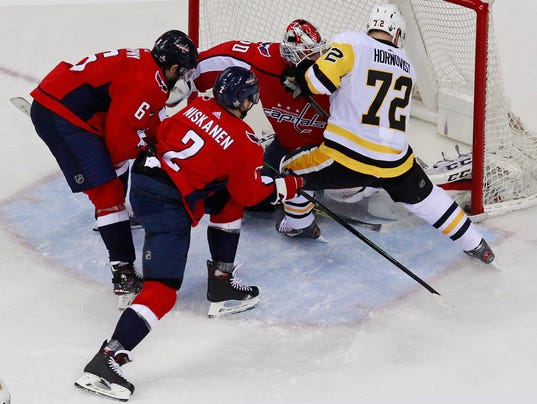By Chris Harlan
April 29, 2018
(Christopher Horner/Tribune-Review)
The record books won't say so, but Nick Kingham's major league debut was just about perfect.
The Pirates call-up retired the first 20 batters he faced Sunday and allowed just one hit in seven spectacular innings to defeat the Cardinals, 5-0, at PNC Park. The lone hit was a two-out single in the seventh by Paul DeJong, but otherwise Kingham had the Cardinals off-balance all afternoon.
The 26-year-old right-hander struck out nine.
"It's incredible how it happened," said Kingham, who left the field to a standing ovation after the seventh with his pitch count at 98.
"It kind of started from the get-go. It went well," he said. "I kept my foot on the gas pedal and kept pushing. The defense was right there behind me every step of the way. It's just a really awesome feeling."
Kingham twice battled through 10-pitch at-bats, each time forcing a Cardinals hitter to fly out harmlessly, all the while looking calm considering the circumstance.
"Watching him, it was just his next start," manager Clint Hurdle said. "It had to be more than that, but he compartmentalized very well."
"I was nervous, no doubt," said Kingham, who had his family in the crowd. "But it's good to be nervous. That means I feel like I care."
The victory earned the Pirates (17-11) a three-game sweep of the Cardinals (15-12) and kept them alone atop the NL Central standings. It also extended the team's winning streak to five.
The series finale drew 14,378.
Catcher Elias Diaz went 3 for 4 with two RBIs and a run scored as the Pirates collected 10 hits. Diaz has played alongside Kingham in the minors since Single-A and wasn't surprised by the rookie's composure on the mound. Kingham estimated Diaz had caught him at least 20 times and maybe 40.
"The way that he acted today, he's been like that for all of his career," Diaz said. "He thinks that he's the best. He likes to look pretty. That's him."
But Diaz added he was nervous for him.
"I was thinking perfect game for him and perfect game for me," Diaz said, "because I'd never caught a perfect game or no-hitter. That's why we were aggressive."
Kingham was nearing a call-up in 2015 when elbow pain revealed a torn ulnar collateral ligament. Tommy John surgery cost him the rest of that season and delayed his arrival in Pittsburgh by three years. The 2010 fourth-round draft pick was 2-1 with a 1.59 ERA in four starts at Triple-A Indianapolis this season with 27 strikeouts in 222⁄3 innings.
He'll travel with the Pirates on a nine-game road trip that starts Monday in Washington.
With a fastball that touched 94 mph and a slider he added only recently, Kingham struck out the side in the second inning Sunday. He got Marcell Ozuna and Jedd Gyorko on four pitches apiece and needed just three to strike out Yadier Molina.
When his next two innings also were also perfect, Kingham realized this start was something special.
"When I was through with the fourth, walking off it hit me," he said. "Then every inning I was thinking about it the whole game. So I was definitely aware of it."
In the seventh, facing a 2-2 count with two outs, DeJong pulled an 85-mph slider down the third-base line. Colin Moran made a diving attempt but couldn't reach the hard-hit grounder.
"Get it, get it, get it, get it," Kingham said was his first thought, "and then I said, you know what, it was a good run, man. It was fun while it lasted."
Michael Feliz and Edgar Santana combined for two scoreless innings in relief.
Cardinals starter Luke Weaver (2-2) held the Pirates scoreless through five, but they broke through in the sixth with four runs on four singles, two walks and a hit batter.
With the bases loaded, Diaz sliced a two-run single down the right-field line, scoring Starling Marte and Josh Bell, who each had singled. The Cardinals then replaced Weaver with Jordan Hicks, and Moran followed with an RBI single that scored Corey Dickerson.
After Kingham drew a two-out walk to reload the bases, Hicks hit Adam Frazier with a pitch that forced in Moran from third to lead 4-0.
Weaver was charged with all four earned runs. The right-hander allowed six hits, four walks and struck out two.
The Pirates added a run in the eighth on an RBI single by David Freese that scored Diaz.
Kingham said his teammates were avoiding him in the dugout while the perfect game was intact but was touched by the stadium-wide response once his first start was finished.
"It was awesome," Kingham said. "This is what this city is known for. They love their sports. They support their guys. I felt it today."
Chris Harlan is a Tribune-Review staff writer. Reach him at charlan@tribweb.com or via Twitter @CHarlan_Trib.



/cdn.vox-cdn.com/uploads/chorus_image/image/58821611/usa_today_10294185.0.jpg)

